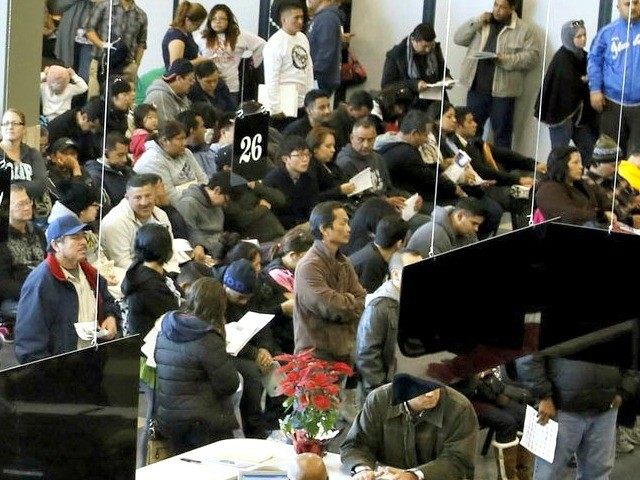In politics as in life, timing is everything. What was good advice last century might not be quite as effective anymore.
For example, It was possible for a high school graduate in Michigan in 1965 to make a good living on the automotive assembly line. However, if you encouraged a 17-year-old to skip college today and apply “down at the plant,” (if you could find a plant operating nearby) you’d probably be brought up on charges of child abuse.
Times change. It’s no longer considered a sure thing to try to build an upper-middle class life around an assembly line job. So, too, with open-borders policies.
For decades, The Wall Street Journal editorial board has used the arguments of American history to support an open immigration policy. “[D]uring the immigration debate of 1984 we suggested an ultimate goal to guide passing policies–a constitutional amendment: ‘There shall be open borders,’” Robert Bartley wrote in 2001. And he doubled down that year. “Immigration continues to refresh and nourish America; we would be better off with more of it,” he wrote.
Give the editors credit for consistency: they’re still promoting open borders. Last week, they took aim directly at Sen. Jeff Sessions (R-AL). He has called for the U.S. to crack down on illegal immigration, while also reducing the number of legal immigrants we allow in.
More troubling is that he is also a symptom of a return of an anti-growth strain within the GOP. This wing of the party opposes immigration and thus turns away thousands of the world’s brains who want to be American. It opposes trade because it fears the U.S. can’t compete.
The problem is that they’re trying to bring a twentieth century approach into the twenty-first century.
In the great sweep of American history, immigration has been a good thing. A trip to New York City’s Tenement Museum tells the tale of a growing, industrial nation. A family from Eastern Europe could make a living sewing clothing in their tiny apartment. Within a generation, the family was running a tailor shop in the suburbs. The American dream, at that time.
But it’s not 1915 anymore.
In that economy, manufacturing was encouraged. Plenty of hands were needed to operate the newfangled assembly lines, which, in turn, provided a way up for the immigrants.
Today, making things seems to be frowned upon by the federal government, since making things inevitably leads to carbon dioxide emissions. And the country’s government seems more worried about battling the specter of “global warming” than about giving the next generation a chance to succeed. EPA aims to shutter dozens of power plants, for example. In this atmosphere, today’s non-existent economic growth (0.2 percent in the first quarter) feels like the new normal.
That’s why the WSJ is simply wrong to say immigration automatically leads to growth. Bring more workers into an economy that’s not growing and you end up with an oversupply of labor, which drives down wages. It’s mathematical economics.
Today’s economy isn’t creating enough jobs for those who are already here; in April, more than one-third of Americans were not in the work force. So immigration, whether legal or illegal, is simply serving to hold down wages. Even The New York Times discovered this when it recently looked into the manicure industry in its backyard.
Among the more than 100 workers interviewed by the NYT, only about a quarter said they were paid an amount that was the equivalent of New York State’s minimum hourly wage. All but three workers, however, had wages withheld in other ways that would be considered illegal, such as never getting overtime.
Why is pay so low? Because there is an abundance of illegal immigrants available to work cheap.
“Almost all of the workers interviewed by The Times, like Ms. Ren, had limited English; many are in the country illegally. The combination leaves them vulnerable,” the newspaper added.
Vulnerable? You don’t say.
In an interesting twist, then, it’s anti-illegal immigration crusaders such as Sen. Sessions who are actually out to help the illegals. If they weren’t here (illegally) they wouldn’t be available to be exploited by cruel salon owners, builders, landscapers, and so forth.
The WSJ concludes that “what America’s working families need most after the Obama era is a healthy, vibrant and growing economy that creates more jobs, increases paychecks and expands opportunity.”
Well, exactly. Reducing regulation would be a start toward that economy; boosting the number of immigrants won’t.
The United States has always been a generous host. We remain so, to a fault. Roughly a million immigrants are welcomed to our shores, legally, each year. That’s too many for the dwindling work available here.
Sen. Sessions is simply calling for a timeout. He wants to slash that number and eliminate the number coming illegally, to allow the economy to begin growing and boosting wages for those who are here legally. That’s a realistic response to our twenty-first century economic problems.

COMMENTS
Please let us know if you're having issues with commenting.